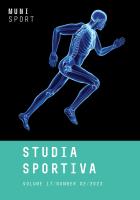The Effects of Plyometric Training on the Running Speed in Soccer
The Effects of Plyometric Training on the Running Speed in Soccer
Author(s): Marek Kokinda, Tomáš Kozák, Michal Fečík, Ondrej VilnerSubject(s): Sports Studies
Published by: Masarykova univerzita nakladatelství
Keywords: Soccer; Physical conditioning; Running; Speed; Sports games
Summary/Abstract: The plyometric method can be referred to as specific neuromuscular training, which may be used to optimize soccer players’ functional status and physical fitness levels. The development of functional strength, which can be repeatedly used under game conditions, is decisive for success in the games themselves. The paper aims to extend knowledge about the effects of plyometric training on running speed among soccer players. Twelve U19 soccer players from the MFK Ružomberok soccer club participated in the experiment. The control group consisted of twelve U19 soccer players from the FC Lokomotíva Košice soccer club. Both groups of soccer players performed 10-m, 30-m, and 50-m running tests and an agility T-test. From the viewpoint of determining the efficiency of the plyometric method, the testing also included tests aimed to assess ankle mobility and jump tests with and without countermovement performed with the use of Optogait. The soccer players from the experimental group participated in a 9-week intervention program that included two 30-minute training sessions per week. As regards the effects of plyometric training on running speed, soccer players improved their running speed levels in both acceleration speed and running speed with changes of direction. The results show that these changes are determined by ankle mobility and lower-body explosive power levels.
Journal: Studia sportiva
- Issue Year: 17/2023
- Issue No: 2
- Page Range: 7-15
- Page Count: 9
- Language: English

